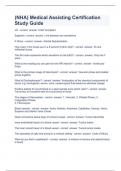(NHA) Medical Assisting Certification
Study Guide
CC - correct answer Chief Complaint
Segment - correct answer Line between two waveforms
P Wave - correct answer Arterial Depolarization
How many 1mm boxes are in a 6 second rhythm strip? - correct answer 30 one
millimeter boxes
The SA node represents which waveform on the EKG? - correct answer Only the P
wave
What is the reading you can get from the RR interval? - correct answer Ventricular
Pulse
What is the primary stage of Hemolysis? - correct answer Vascular phase and platelet
phase together
What is Electrophoresis? - correct answer Analyzation of the chemical components of
blood, e.g. hemoglobin, serum, urine, cerebrospinal fluid based on electrical charge.
Positive testing for occult blood in a stool sample turns which color? - correct answer
Turns blue on a positive test for occult blood in feces
The stages of Hemostasis - correct answer 1. Vascular, 2. Platelet Phase, 3.
Coagulation Phase,
4. Fibronolysis
Blood vessels - correct answer Aorta, Arteries, Arterioles, Capillaries, Venues, Veins,
Superior and Inferior Vena Cavae
Outer connective tissue layer of a blood vessel - correct answer Tunica Adventitia
Inner endothelial tissue of a blood vessel - correct answer Tunica Intima
The inner smooth layer of a blood vessel - correct answer Tunica tunica media
The standards of right and wrong in a medical setting - correct answer Code of Ethics
What do you find in capillaries? - correct answer A mixture of venous and arterial blood
is found
,The average adult has how many liters of blood? - correct answer 5-6 Liters
What is the percentage of water in the blood? - correct answer 92%
Percentage of plasma in the blood? - correct answer 55%
Percentage of formed elements in the blood? - correct answer 45%
99% of formed elements in the blood - correct answer RBC,s or Erythrocytes
Where do you find hemoglobin? - correct answer RBC,s
Where do all blood cells originate? - correct answer Bone marrow
How many RBC,s per microliter of blood - correct answer 4.2-6.2 million
What is the second most numerous WBC - correct answer Lymphocyte with 20-40%
Their numbers increase in intracellular infections and TB - correct answer Monocytes
Their numbers increase in bacterial infections and are often first on the scene - correct
answer Neutrophils
These WBC,s play an important role in viral infection as well as in immunity - correct
answer Lymphocytes
Number of leukocytes for average adult per microliter - correct answer 5000-10000
Leukopenia - correct answer Decrease in WBC,s seen with viral infection and
leukemia
Comprises 3-8% of WBC or leukocytes - correct answer Monocytes
Largest in size of the leukocytes - correct answer Monocytes
Carries histamine - correct answer Basophil
Injury to a blood vessel that causes it to constrict, slowing the clod of blood. - correct
answer Vascular phase of Hemostasis
Preferred site for a venipuncture - correct answer Antecubital Fossa
Test used to evaluate the intrinsic pathway and monitor heparin therapy - correct
answer APTT also know as PTT
, Test used to evaluate the extrinsic pathway and also used to monitor warfarin therapy -
correct answer PT
Fibrinolysis - correct answer Breakdown and removal of a clot
Converts the temporary platelet plug in a stable fibrin clot - correct answer Coagulation
Phase
2nd choice vein for venipuncture and most often the only one palatable in an obese Pt. -
correct answer Cephalic vein
Antiseptics used in Phlebotomy - correct answer 70% isopropyl alcohol pads most
common, provolone - iodine for BC,s and Chlorhexidine gluconate for patients that are
allergic to Betadine/ Iodine
Length of needle commonly used in venipuncture - correct answer 1 inch (up to 1.5")
Average gauge of needle used for drawing blood - correct answer 21-22
Gauge of needle that can cause hemolysis - correct answer smaller than 23 gauge
3 skills of the phlebotomist - correct answer Social, clerical, technical
Analytical errors during collection of blood - correct answer Extended tourniquet time,
hemolysis, wrong order of draw, failure to invert tubes, faulty technique under filling
tubes
Analytical errors before collection of blood - correct answer Patient misidentification,
improper time, wrong tubes, not fasting, exercise (Cortisol levels), Pt. Posture, Poor
coordination with other treatments, improper site prep, medication interference
Analytical errors After collection of blood - correct answer Failure to separate serum
from cell (Glycolisis), improper use of serum separator (Not inverting tubes or not
spinning tubes), delays in processing, exposure to light, improper storage conditions,
dimming clots
Fistula - correct answer Permanent surgical connection between an artery and a vein,
never used for venipuncture
Edima - correct answer Accumulation of fluid in tissue
Thrombophlebitis - correct answer Inflammation of a blood clot formation
Explanation of Hemoconcentration - correct answer The increase in proportion of
formed elements to plasma caused by leaving on the tourniquet for more than two
minutes




